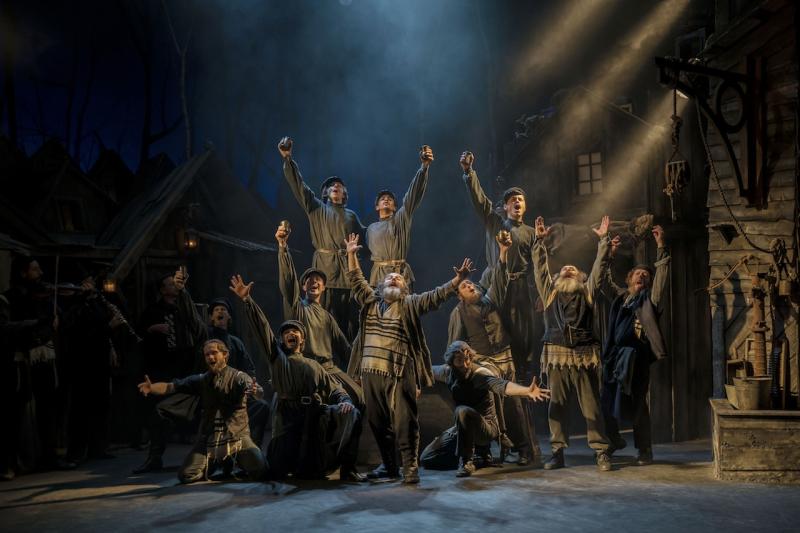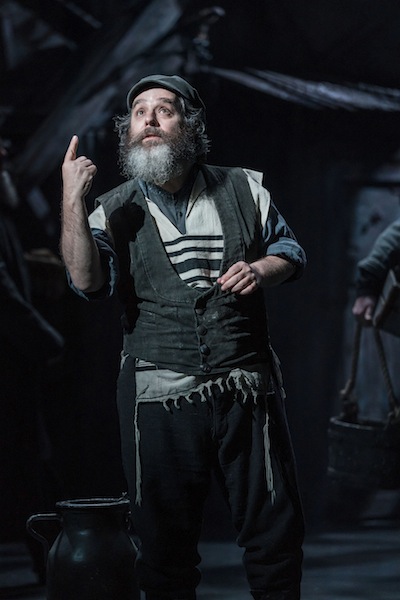Fiddler on the Roof, Playhouse Theatre, review – energetic production whips up an emotional storm | reviews, news & interviews
Fiddler on the Roof, Playhouse Theatre, review – energetic production whips up an emotional storm
Fiddler on the Roof, Playhouse Theatre, review – energetic production whips up an emotional storm
A spikily poignant reminder of humanity in politically dark times

In an age where political, social, and gender norms seem to be in perpetual meltdown, it should be pretty much impossible for a musical that begins with a song celebrating ‘Tradition’ to strike a chord.
The musical – the latest West End transfer from production powerhouse, the Menier Chocolate Factory - is famously based on Sholem Aleichem’s stories about a Jewish family living in a shtetl in Imperial Russia at the turn of the twentieth century. While it had plenty of awards thrown at it when it debuted in 1964, several detractors denounced it for sentimentality with the late Philip Roth going as far as to decry it as shtetl kitsch.
However, at a time when anti-Semitism is prevalent everywhere from the gilets jaunes protests in France to the shameless anti-Soros campaign in Hungary, what might once have been dismissed for saccharine emotion now comes across as a resonant celebration of humanity. That’s due not least to Andy Nyman’s robustly fallible incarnation of Tevye, the poor Jewish milkman with five daughters who makes garrulous appeals to God about everything from his horse’s lameness to whom he should accept as a son-in-law.
Robert Jones’ ingenious design welcomes the audience into the shtetl from the word go, by extending the bare-branched trees and wooden fences along the edges of auditorium. On the stage itself, the grey-roofs of the settlement huddle together almost as if they had sprung up from the forest floor. The use of the auditorium to extend the stage space works particularly strongly when the villagers go into exile, and we watch them forming a long procession through the snow. Tim Lutkin’s deftly deployed lighting enhances this powerful stage picture, illuminating both the hostile winter elements and the sense of how endless the path is that must be trod by the characters as they contemplate their uncertain future.
Nunn’s co-ordination of the cast is beautifully echoed by musical director Paul Bogaev conducting of the orchestra. In both the predominant enjoyment is in the sense of vigorous defiance embodied by the ensemble, though this does not stop the solos ringing out with a combination of plangency and humour. As the evening progresses, gradually each individual starts to score themselves on our hearts, whether it’s Joshua Gannon’s self-deprecating tailor, Motel, Judy Kuhn’s long-suffering Golde, or Molly Osbourne’s Tzeitel, terrified of being married off to an old rich butcher. As one of the least sympathetic though most comedic characters, Yente the Matchmaker, Louise Gold puts in a sterling performance as a gossipy hypocrite whose miserable former marriage does not stop her from wanting to subject others to similar miseries.
 While the threat of persecution constantly hangs over a community bound together by its rituals and impoverishment, it is also continually challenged from within by that greatest of all disruptors, love. Perhaps Tevye’s greatest charm – expressed in those monologues to God in which the lighting changes, and he wrestles comedically with his conscience like a bearded, more generously proportioned Hamlet – is the fact that, with one significant exception, he generally ends up acknowledging love’s importance. Characteristically of this production, love is expressed as movingly by the whole community as it is individually, and the joy running through Nunn’s staging of the Jewish wedding between Motel and Tzeitel, complete with bottle dance, is tangible. Being a drama, it’s the tension that makes it as much as the unity – and the moment when Stewart Clarke’s revolutionary Perchik crosses the barrier between the men and the women to dance with Harriet Bunton’s Hodel is one of the most resonant moments of the evening.
While the threat of persecution constantly hangs over a community bound together by its rituals and impoverishment, it is also continually challenged from within by that greatest of all disruptors, love. Perhaps Tevye’s greatest charm – expressed in those monologues to God in which the lighting changes, and he wrestles comedically with his conscience like a bearded, more generously proportioned Hamlet – is the fact that, with one significant exception, he generally ends up acknowledging love’s importance. Characteristically of this production, love is expressed as movingly by the whole community as it is individually, and the joy running through Nunn’s staging of the Jewish wedding between Motel and Tzeitel, complete with bottle dance, is tangible. Being a drama, it’s the tension that makes it as much as the unity – and the moment when Stewart Clarke’s revolutionary Perchik crosses the barrier between the men and the women to dance with Harriet Bunton’s Hodel is one of the most resonant moments of the evening.
There comes a point when you realise that most of the greatest artistic works are those that – rather than firmly categorising different aspects of life – wake us up to our humanity, with all its cracks, flaws, and fallibility. It’s perhaps in the moments when Fiddler on the Roof celebrates the vulnerability in all of us that it is strongest. Like the point when Golde expresses her amazement that the child she remembers carrying in her womb is now getting married, or she and Tevye sing about the more mundane aspects of long-term love. This is what it’s really about to be alive, and this production captures that with full-blooded humour.
This, then, is an evening to be celebrated as a spikily poignant reminder of what it is to be human in politically dark times. Both whirlingly energetic and achingly moving, it marks itself out straight away as one of the most uplifting nights possible to be had in the West End right now.
- Fiddler on the Roof at the Playhouse Theatre till 15 June
- Read more theatre reviews on theartsdesk
rating
Share this article
The future of Arts Journalism
You can stop theartsdesk.com closing!
We urgently need financing to survive. Our fundraising drive has thus far raised £49,000 but we need to reach £100,000 or we will be forced to close. Please contribute here: https://gofund.me/c3f6033d
And if you can forward this information to anyone who might assist, we’d be grateful.

Subscribe to theartsdesk.com
Thank you for continuing to read our work on theartsdesk.com. For unlimited access to every article in its entirety, including our archive of more than 15,000 pieces, we're asking for £5 per month or £40 per year. We feel it's a very good deal, and hope you do too.
To take a subscription now simply click here.
And if you're looking for that extra gift for a friend or family member, why not treat them to a theartsdesk.com gift subscription?
more Theatre
 Interview, Riverside Studios review - old media vs new in sparky scrap between generations
Robert Sean Leonard and Paten Hughes make worthy sparring partners
Interview, Riverside Studios review - old media vs new in sparky scrap between generations
Robert Sean Leonard and Paten Hughes make worthy sparring partners
 Fat Ham, RSC, Stratford review - it's Hamlet Jim, but not as we know it
An entertaining, positive and contemporary blast!
Fat Ham, RSC, Stratford review - it's Hamlet Jim, but not as we know it
An entertaining, positive and contemporary blast!
 Juniper Blood, Donmar Warehouse review - where ideas and ideals rule the roost
Mike Bartlett’s new state-of-the-agricultural-nation play is beautifully performed
Juniper Blood, Donmar Warehouse review - where ideas and ideals rule the roost
Mike Bartlett’s new state-of-the-agricultural-nation play is beautifully performed
 The Gathered Leaves, Park Theatre review - dated script lifted by nuanced characterisation
The actors skilfully evoke the claustrophobia of family members trying to fake togetherness
The Gathered Leaves, Park Theatre review - dated script lifted by nuanced characterisation
The actors skilfully evoke the claustrophobia of family members trying to fake togetherness
 As You Like It: A Radical Retelling, Edinburgh International Festival 2025 review - breathtakingly audacious, deeply shocking
A cunning ruse leaves audiences facing their own privilege and complicity in Cliff Cardinal's bold theatrical creation
As You Like It: A Radical Retelling, Edinburgh International Festival 2025 review - breathtakingly audacious, deeply shocking
A cunning ruse leaves audiences facing their own privilege and complicity in Cliff Cardinal's bold theatrical creation
 Edinburgh Fringe 2025 reviews: Refuse / Terry's / Sugar
A Ukrainian bin man, an unseen used car dealer and every daddy's dream twink in three contrasting Fringe shows
Edinburgh Fringe 2025 reviews: Refuse / Terry's / Sugar
A Ukrainian bin man, an unseen used car dealer and every daddy's dream twink in three contrasting Fringe shows
 Faustus in Africa!, Edinburgh International Festival 2025 review - deeply flawed
Bringing the Faust legend to comment on colonialism produces bewildering results
Faustus in Africa!, Edinburgh International Festival 2025 review - deeply flawed
Bringing the Faust legend to comment on colonialism produces bewildering results
 Edinburgh Fringe 2025 reviews: Imprints / Courier
A slippery show about memory and a rug-pulling Deliveroo comedy in the latest from the Edinburgh Fringe
Edinburgh Fringe 2025 reviews: Imprints / Courier
A slippery show about memory and a rug-pulling Deliveroo comedy in the latest from the Edinburgh Fringe
 Edinburgh Fringe 2025 reviews: The Ode Islands / Delusions and Grandeur / Shame Show
Experimental digital performance art, classical insights and gay shame in three strong Fringe shows
Edinburgh Fringe 2025 reviews: The Ode Islands / Delusions and Grandeur / Shame Show
Experimental digital performance art, classical insights and gay shame in three strong Fringe shows
 Edinburgh Fringe 2025 reviews: Ordinary Decent Criminal / Insiders
Two dramas on prison life offer contrasting perspectives but a similar sense of compassion
Edinburgh Fringe 2025 reviews: Ordinary Decent Criminal / Insiders
Two dramas on prison life offer contrasting perspectives but a similar sense of compassion
 Edinburgh Fringe 2025 reviews: Kinder / Shunga Alert / Clean Your Plate!
From drag to Japanese erotica via a French cookery show, three of the Fringe's more unusual offerings
Edinburgh Fringe 2025 reviews: Kinder / Shunga Alert / Clean Your Plate!
From drag to Japanese erotica via a French cookery show, three of the Fringe's more unusual offerings
 The Two Gentlemen of Verona, RSC, Stratford review - not quite the intended gateway drug to Shakespeare
Shakespeare trying out lots of ideas that were to bear fruit in the future
The Two Gentlemen of Verona, RSC, Stratford review - not quite the intended gateway drug to Shakespeare
Shakespeare trying out lots of ideas that were to bear fruit in the future

Add comment